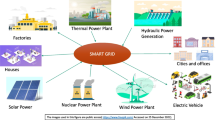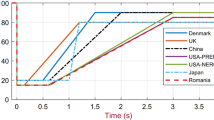Abstract
Hybrid renewable-based power production has emerged as a crucial development in the electrical power system because to its ability to supply consumers with cost-effective and carbon-free electricity. Incorporating several renewable energy sources and storage systems with a grid-connected system necessitates extra design requirements, which raising the renewable system’s overall cost. Therefore, optimizing the size of the components is essential to minimizing the cost of the system and limiting its negative impacts. This paper presents a hybrid of Particle Swarm Optimization (PSO) and Harris Hawks Optimization (HHO) known as PSHHO technique-based economic analysis of smart grid (SG) Hybrid Renewable Energy Systems (HRES). Here, the hybrid PSHHO approach is presented to tackle the problem of HRES cost analysis. The major purpose of this study is to minimize the system cost and increase overall system efficiency. Finally, the proposed approach is tested in the MATLAB tool, and the performance of the proposed method is compared with other existing methods such as HHO, PSO, and WOA. The result demonstrates the proposed system can meet the load demand with low Cost of Energy (COE) (21.5 Rs/kWh) than existing methods.





Similar content being viewed by others
References
Makade RG, Chakrabarti S, Jamil B (2021) Development of global solar radiation models: a comprehensive review and statistical analysis for indian regions. J Clean Prod 293:126208
Akella AK, Saini RP, Sharma MP (2009) Social, economical and environmental impacts of renewable energy systems. Renew Energy 34(2):390–396
Pathak DP, Khatod D (2017) Optimum utilization of alternative sources of energy for an un-electrified remote area. In: 2017 14th IEEE India council international conference (INDICON). IEEE, pp 1–6
Singh AK, Khatoon S, Muazzam M, Chaturvedi DK (2012) Load forecasting techniques and methodologies: a review. In: 2012 2nd international conference on power, control and embedded systems, pp 1–10. IEEE
Haque ME, Negnevitsky M, Muttaqi KM (2008). A novel control strategy for a variable speed wind turbine with a permanent magnet synchronous generator. In: 2008 IEEE industry applications society annual meeting, pp 1–8. IEEE
Mohamed MA, Eltamaly AM, Alolah AI (2016) PSO-based smart grid application for sizing and optimization of hybrid renewable energy systems. PLoS ONE 11(8):e0159702
Dhar P, Chakraborty N (2021) Optimal techno-economic analysis of a renewable based hybrid microgrid incorporating gravity energy storage system in indian perspective using whale optimization algorithm. Int Trans Electr Energy Syst 31(9):e13025
Rizwan M, Hong L, Muhammad W, Azeem SW, Li Y (2021) Hybrid Harris hawks optimizer for integration of renewable energy sources considering stochastic behavior of energy sources. Int Trans Electr Energy Syst 31(2):e12694
Suresh M, Meenakumari R (2021) Optimum utilization of grid connected hybrid renewable energy sources using hybrid algorithm. Trans Inst Meas Control 43(1):21–33
Kusakana K (2021) Optimal economic dispatch of Grid-Interactive renewable prosumers with hybrid storage and peer to peer energy sharing capabilities. Int J Electr Electron Eng Telecommun 10(3):209–216
Jadoun VK, Prashanth GR, Joshi SS, Narayanan K, Malik H, Márquez FPG (2022) Optimal fuzzy based economic emission dispatch of combined heat and power units using dynamically controlled Whale optimization algorithm. Appl Energy 315:119033
Jain S, Sawle Y (2021) Optimization and comparative economic analysis of standalone and grid-connected hybrid renewable energy system for remote location. Front Energy Res 9:724162
Ashtiani MN, Toopshekan A, Astaraei FR, Yousefi H, Maleki A (2020) Techno-economic analysis of a grid-connected PV/battery system using the teaching-learning-based optimization algorithm. Sol Energy 203:69–82
Karimulla S, Ravi K (2021) Minimization of cost of energy with renewable energy sources by using fire-fly algorithm. J Appl Sci Eng 25(3):461–470
Mansouri Kouhestani F, Byrne J, Johnson D, Spencer L, Brown B, Hazendonk P, Scott J (2020) Multi-criteria PSO-based optimal design of grid-connected hybrid renewable energy systems. Int J Green Energy 17(11):617–631
Sadeghi D, Naghshbandy AH, Bahramara S (2020) Optimal sizing of hybrid renewable energy systems in presence of electric vehicles using multi-objective particle swarm optimization. Energy 209:118471
Lei G, Song H, Rodriguez D (2020) Power generation cost minimization of the grid-connected hybrid renewable energy system through optimal sizing using the modified seagull optimization technique. Energy Rep 6:3365–3376
Sharma V, Haque MH, Aziz SM (2019) Energy cost minimization for net zero energy homes through optimal sizing of battery storage system. Renew Energy 141:278–286
Geleta DK, Manshahia MS, Vasant P, Banik A (2022) Grey wolf optimizer for optimal sizing of hybrid wind and solar renewable energy system. Comput Intell 38(3):1133–1162
Acakpovi A, Adjei P, Nwulu N, Asabere NY (2020) Optimal hybrid renewable energy system: a comparative study of wind/hydrogen/fuel-cell and wind/battery storage. J Electr Comput Eng 2020:1–15
Suresh M, Meenakumari R (2021) An improved genetic algorithm-based optimal sizing of solar photovoltaic/wind turbine generator/diesel generator/battery connected hybrid energy systems for standalone applications. Int J Ambient Energy 42(10):1136–1143
Das S, Abraham A, Konar A (2008) Particle swarm optimization and differential evolution algorithms: technical analysis, applications and hybridization perspectives. In: Liu Y, Sun A, Loh HT, Lu WF, Lim EP (eds) Advances of computational intelligence in industrial systems. Springer, Heidelberg, pp 1–38
Heidari AA, Mirjalili S, Faris H, Aljarah I, Mafarja M, Chen H (2019) Harris hawks optimization: algorithm and applications. Fut Gener Comput Syst 97:849–872
Houssein EH, Gad AG, Hussain K, Suganthan PN (2021) Major advances in particle swarm optimization: theory, analysis, and application. Swarm Evol Comput 63:100868
Pathak DP, Khatod D (2017) Optimum utilization of alternative sources of energy for an un-electrified remote area. In: 2017 14th IEEE India council international conference (INDICON), pp 1–6. IEEE
Acknowledgements
The Author with a deep sense of gratitude would thank the supervisor for his guidance and constant support rendered during this research.
Funding
Authors did not receive any funding.
Author information
Authors and Affiliations
Corresponding author
Ethics declarations
Conflict of interest
Authors do not have any conflicts.
Additional information
Publisher’s Note
Springer Nature remains neutral with regard to jurisdictional claims in published maps and institutional affiliations.
Rights and permissions
Springer Nature or its licensor (e.g. a society or other partner) holds exclusive rights to this article under a publishing agreement with the author(s) or other rightsholder(s); author self-archiving of the accepted manuscript version of this article is solely governed by the terms of such publishing agreement and applicable law.
About this article
Cite this article
Gnana Malar, A.J., Sellamuthu, S., Ganga, M. et al. Power System Planning and Cost Forecasting Using Hybrid Particle Swarm-Harris Hawks Optimizations. J. Electr. Eng. Technol. 19, 1023–1031 (2024). https://doi.org/10.1007/s42835-023-01610-z
Received:
Revised:
Accepted:
Published:
Issue Date:
DOI: https://doi.org/10.1007/s42835-023-01610-z




